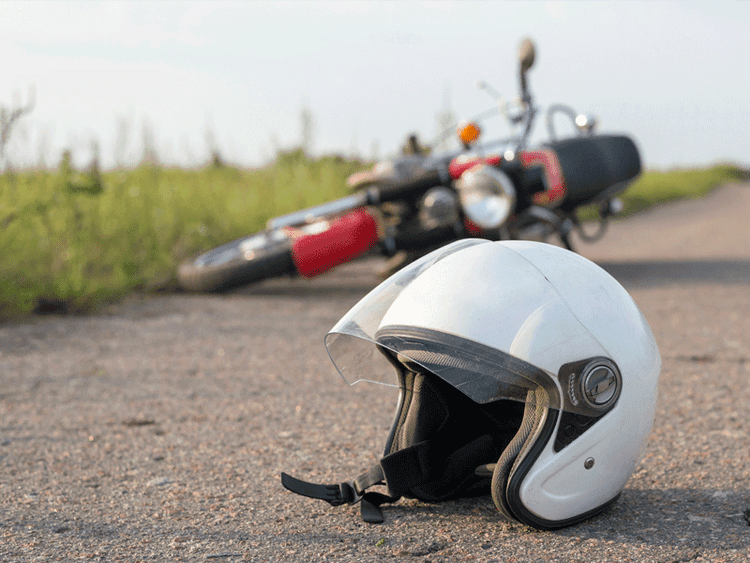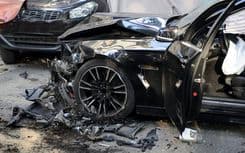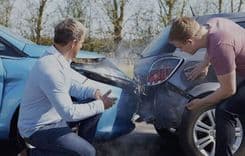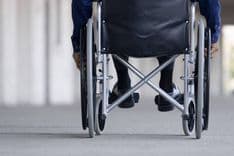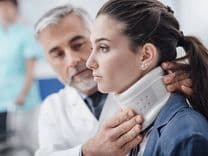As a means of transport in the city, motorbikes offer many advantages over cars. However, motorcyclists are more vulnerable in the event of a traffic accident because they are very exposed and injuries can be quite serious. In addition to this, claiming compensation for a motorbike or moped accident is more complex.
If you have suffered a traffic accident on a motorbike, we will tell you what your rights are in case you want to claim compensation.
In what cases can you claim compensation for a motorbike accident?
Provided that the traffic accident was caused by the fault of another driver, the motorcyclist can claim compensation for the temporary injuries, after-effects and material damage caused by the accident.
On the other hand, if at the time of the accident you were travelling as a passenger, you are entitled to claim compensation regardless of whether the driver was responsible for the accident.
In any case, it will be the insurance company of the responsible party who will pay the financial compensation.
Motorbike accident compensation
In motorbike accidents, compensation is calculated according to the system of valuation of damages caused in traffic accidents established by Law 35/2015, of 22nd September.
Therefore, the driver of the motorbike and his passenger, if there is one, can claim for the physical and patrimonial injury they have suffered, which we will explain in detail below.
Compensation for temporary injuries
Temporary incapacity or temporary injuries are those that prevent you from carrying out your normal day-to-day activities. This type of compensation is intended to compensate the injured party during the period of time from the motorbike accident until the injuries are healed or stabilised.
The items that are included in a compensation for temporary injuries are:
- Damage for days of affection.
- Damage due to surgical intervention.
- The patrimonial injury or damage.
Regarding the damage per days, depending on the degree to which the injuries affect the ordinary life of the injured party, four types of days are distinguished.
Days of very serious personal damage
These are days in which the victim lacks autonomy to carry out the normal activities of daily life. An example would be an admission to the ICU.
Days of serious personal damage
These are days in which the injuries prevent the person from carrying out most of the essential activities of his or her life, such as when the person is admitted to hospital.
Days of moderate personal damage
These usually correspond to the days when the injured person is on sick leave, as he/she is unable to attend to his/her professional activities.
Days of basic personal damage
These are the remaining days that elapse from the time the victim resumes his/her professional activity until the end of the rehabilitation treatment or medical discharge. In other words, all those days that cannot be classified in the previous sections.
Compensation for sequelae or aftereffects
A sequel or permanent incapacity is understood to be those damages that persist as a consequence of an injury once the healing or rehabilitation treatment has been completed.
The after-effects are assessed using a points system or medical scale where a range of points is established, with a minimum and a maximum, and the after-effects are assessed depending on their intensity. This quantification must be done by a doctor who is an expert in the valuation of the injury.
In a compensation for after-effects, the following can be claimed:
- The basic personal damage.
- Particular personal damage.
- The patrimonial loss due to loss of earnings and/or consequential damage.
In the item destined to compensate the basic personal damage, two types of after-effects are distinguished whose sum will give the total amount to be claimed for this concept.
They are the following:
Functional after-effects
These are the after-effects that affect the functions performed by the organs, tissues, apparatus or systems of the human body. For example, hearing loss or limitation of ankle flexion.
In the assessment of functional sequelae, these three rules apply:
- Concurrent sequelae. When two or more functional sequelae occur as a result of the same accident.
- Inter-aggravatory sequelae. If several limbs with identical function are affected.
- Aggravating sequelae of the previous condition. In the event that the after-effects aggravate a pathology suffered by the victim before the accident.
Aesthetic after-effects
This item compensates the injured party for all the after-effects that affect his image as a consequence of the accident and that are impossible to correct.
Here we take into account both the static dimension, scars, abrasions, etc., and the dynamic dimension, as sometimes these types of after-effects also involve a functional impairment, such as the amputation of a limb.
The aesthetic damage, as well as the functional damage, is assessed on the basis of a specific scale that takes into account various factors such as the degree of visibility or the effect on the interpersonal relationships of the affected person, among others.
In addition, this section also takes into account whether plastic surgery has to be carried out.
Compensation for patrimonial loss
In a pratrimonial damage compensation, the cost of repairing the damage to the vehicle and everything that the driver has with him, both equipment and personal belongings, will be compensated.
In order to obtain compensation for damage to the motorbike, a repair estimate must be provided and, in the case of objects, the bills for the purchase of new ones that are similar to the previous ones.
In addition, other economic damages are also compensated under this heading, such as loss of earnings, i.e. the income that is no longer received after the accident, or consequential damages, which are the additional expenses incurred as a result of the accident.
Example of compensation for a motorbike accident
Here is an example of the compensation received by a motorcyclist in 2019 after an accident. Please note that the schedule is updated every year, so the amount may vary at present.
While riding his motorbike, A. L. was knocked to the ground by a car that ran a yield sign. As a result of the fall, A. L. suffered a series of injuries for which he received the following compensation:
- Moderate personal damage (days off work): 58 days x 52 €/day = 3,016 €.
- Basic personal damage (remaining days until the end of rehabilitation): 35 x 30 €/day = 1,050 €.
- After-effects:
- Post-traumatic cervical syndrome = 4 points
- Pain in right shoulder and limitation in abduction and elevation = 9 points
- Patrimonial damage (glasses and helmet damaged in the accident) = 400 €.
The total amount of compensation was 18.299,13 €.
How long does it take to receive the compensation for a motorbike accident?
Generally, the time it takes for the victim of a motorbike accident to receive compensation depends on the time needed to recover from the injuries or at least to stabilise them.
Once you are medically discharged, a specialist doctor will then have to assess the damage suffered and any possible after-effects. With this information, you will be able to calculate the compensation you are entitled to and claim it. The deadline for submitting this claim is one year from the stabilisation of the injuries.
If the responsibility for the accident is clear, the negotiation with the insurer does not usually take long. Therefore, if there is agreement with the offer received, the injured party can receive his compensation between 30 and 60 days after receiving the medical discharge.
However, if legal proceedings are necessary, it is best not to rush. The collection of the compensation will depend on the agility with which the court processes the claim and if the insurer tries to reach an out-of-court settlement.
Main problems in motorbike accidents
The most common problems in motorbike accidents are as follows:
- In most cases, the motorcyclist has to face a presumption of guilt. For this reason, it is very important to collect evidence that clarifies the responsibility for the accident and the damages suffered.
- Sometimes, due to the seriousness of the injuries, the motorcyclist is taken to hospital before a statement can be taken or a friendly report signed. It is therefore important to contact the police as soon as possible to do so.
- When it comes to compensating the material damage suffered by the motorist, insurers usually take into account the depreciation of the objects due to their age and use. Therefore, it is always advisable to keep the purchase invoices of at least the equipment.
- When the cause of the accident is a hit-and-run accident, the Insurance Compensation Consortium is responsible for the compensation, but does not take responsibility for the damage to property. In this case, it is essential to have the police report or witnesses.
Advice if you have suffered a motorbike accident
At the time of the accident it is normal to be nervous and not know what to do. For this reason, we give you these tips so that if you have a motorbike accident, you will know what to do:
Even if you are conscious and can move, don't do it, and if the motorbike has fallen on you, call for help. Injuries can be more serious than they appear and sudden movements can cause more serious damage.
Call 112 and ask for an ambulance and the intervention of the police or Guardia Civil if you are unable to look after yourself.
If the person at fault is willing to admit fault and you are well, complete and sign the accident report. If not, call the police or the Guardia Civil so that they can draw up a report.
On the other hand, if the vehicle responsible has fled, try to identify it with the help of witnesses or other means. If this is not possible, the Insurance Compensation Consortium will be responsible for compensation.
In the event that the accident is not the result of an impact, look for witnesses to what happened to clarify the culpability in the accident.
Injuries often appear within hours of the accident, so go to the hospital as soon as possible, within 72 hours, to get a medical diagnosis.
Contact your insurance company to report that you have been involved in a motorbike accident. You have 7 days after the accident.
If you are going to claim compensation for the injuries and damages suffered, hire a lawyer specialised in traffic accidents, such as those at Traflex. They will advise you and help you through the process and get you fair compensation for your injuries.


